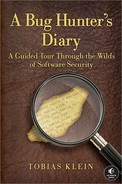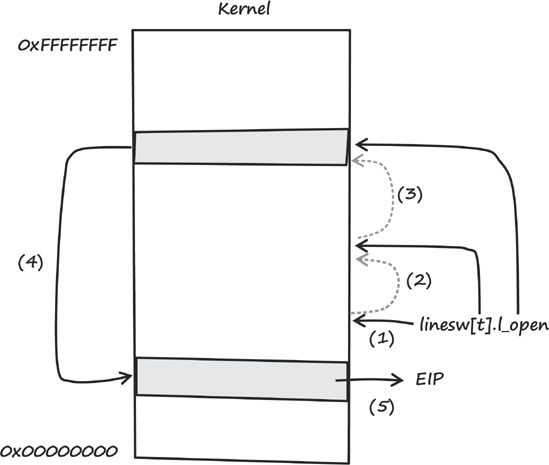Last week my Apple MacBook finally arrived. After getting acquainted with the Mac OS X platform, I decided to take a closer look at the XNU kernel of OS X. After a few hours of digging through the kernel code, I found a nice bug that occurs when the kernel tries to handle a special TTY IOCTL. The bug was easy to trigger, and I wrote a POC code that allows an unprivileged local user to crash the system via kernel panic. As usual, I then tried to develop an exploit to see if the bug allows arbitrary code execution. At this point, things got a bit more complicated. To develop the exploit code, I needed a way to debug the OS X kernel. That’s not a problem if you own two Macs, but I only had one: my brand-new MacBook.
First I downloaded the latest source code release of the XNU kernel,[75] and then I searched for a vulnerability in the following way:
Note
I used an Intel Mac with OS X 10.4.8 and kernel version xnu-792.15.4.obj~4/ RELEASE_I386 as a platform throughout this chapter.
Step 1: List the IOCTLs of the kernel.
Step 2: Identify the input data.
Step 3: Trace the input data.
These steps will be detailed in the following sections.
To generate a list of the IOCTLs of the kernel, I simply searched the kernel source code for the usual IOCTL macros. Every IOCTL is assigned its own number, which is usually created by a macro. Depending on the IOCTL type, the XNU kernel of OS X defines the following macros: _IOR, _IOW, and _IOWR.
osx$pwd/Users/tk/xnu-792.13.8 osx$grep -rnw -e _IOR -e _IOW -e _IOWR *[..] xnu-792.13.8/bsd/net/bpf.h:161:#define BIOCGRSIG _IOR('B',114, u_int) xnu-792.13.8/bsd/net/bpf.h:162:#define BIOCSRSIG _IOW('B',115, u_int) xnu-792.13.8/bsd/net/bpf.h:163:#define BIOCGHDRCMPLT _IOR('B',116, u_int) xnu-792.13.8/bsd/net/bpf.h:164:#define BIOCSHDRCMPLT _IOW('B',117, u_int) xnu-792.13.8/bsd/net/bpf.h:165:#define BIOCGSEESENT _IOR('B',118, u_int) xnu-792.13.8/bsd/net/bpf.h:166:#define BIOCSSEESENT _IOW('B',119, u_int) [..]
I now had a list of IOCTLs supported by the XNU kernel. To find the source files that implement the IOCTLs, I searched the whole kernel source for each IOCTL name from the list. Here’s an example of the BIOCGRSIG IOCTL:
osx$ grep --include=*.c -rn BIOCGRSIG *
xnu-792.13.8/bsd/net/bpf.c:1143: case BIOCGRSIG:To identify the user-supplied input data of an IOCTL request, I took a look at some of the kernel functions that process the requests. I discovered that such functions typically expect an argument called cmd of type u_long and a second argument called data of type caddr_t.
Here are some examples:
- Source code file
xnu-792.13.8/bsd/netat/at.c
[..] 135 int 136 at_control(so,cmd,data, ifp) 137 struct socket *so; 138u_long cmd;139caddr_t data;140 struct ifnet *ifp; 141 { [..]
- Source code file
xnu-792.13.8/bsd/net/if.c
[..] 1025 int 1026 ifioctl(so,cmd,data, p) 1027 struct socket *so; 1028u_long cmd;1029caddr_t data;1030 struct proc *p; 1031 { [..]
- Source code file
xnu-792.13.8/bsd/dev/vn/vn.c
[..] 877 static int 878 vnioctl(dev_t dev,u_long cmd,caddr_t data, 879 __unused int flag, struct proc *p, 880 int is_char) 881 { [..]
The names of these function arguments are quite descriptive: The cmd argument holds the requested IOCTL code, and the data argument holds the user-supplied IOCTL data.
On Mac OS X, an IOCTL request is typically sent to the kernel using the ioctl() system call. This system call has the following prototype:
osx$man ioctl[..]SYNOPSIS#include <sys/ioctl.h>intioctl(int d, unsigned long request, char *argp);DESCRIPTIONTheioctl()function manipulates the underlying device parameters of spe- cial files. In particular, many operating characteristics of character special files (e.g. terminals) may be controlled withioctl()requests. The argument d must be an open file descriptor. An ioctl request has encoded in it whether the argument is an "in" parameter or "out" parameter, and the size of the argument argp in bytes. Macros and defines used in specifying an ioctl request are located in the file <sys/ioctl.h>. [..]
If an IOCTL request is sent to the kernel, the argument request has to be filled with the appropriate IOCTL code, and argp has to be filled with the user-supplied IOCTL input data. The request and argp arguments of ioctl() correspond to the kernel function arguments cmd and data.
I had found what I was looking for: Most kernel functions that process incoming IOCTL requests take an argument called data that holds, or points to, the user-supplied IOCTL input data.
After I found the locations in the kernel where IOCTL requests are handled, I traced the input data through the kernel functions while looking for potentially vulnerable locations. While reading the code, I stumbled upon some locations that looked intriguing. The most interesting potential bug I found happens if the kernel tries to handle a special TTY IOCTL request. The following listing shows the relevant lines from the source code of the XNU kernel.
- Source code file
xnu-792.13.8/bsd/kern/tty.c
[..] 816 /* 817 * Ioctls for all tty devices. Called after line-discipline specific ioctl 818 * has been called to do discipline-specific functions and/or reject any 819 * of these ioctl commands. 820 */ 821 /* ARGSUSED */ 822 int 823 ttioctl(register struct tty *tp, 824u_long cmd,caddr_t data, int flag, 825 struct proc *p) 826 { [..]872 switch (cmd) { /* Process the ioctl. */[..]1089 case TIOCSETD: { /* set line discipline */1090 register int t = *(int *)data;1091 dev_t device = tp->t_dev; 10921093 if (t >= nlinesw)1094 return (ENXIO);1095 if (t != tp->t_line) {1096 s = spltty(); 1097 (*linesw[tp->t_line].l_close)(tp, flag);1098 error = (*linesw[t].l_open)(device, tp);1099 if (error) { 1100 (void)(*linesw[tp->t_line].l_open)(device, tp); 1101 splx(s); 1102 return (error); 1103 } 1104 tp->t_line = t; 1105 splx(s); 1106 } 1107 break; 1108 } [..]
If a TIOCSETD IOCTL request is sent to the kernel, the switch case in line 1089 is chosen. In line 1090, the user-supplied data of type caddr_t, which is simply a typedef for char *, is stored in the signed int variable t. Then in line 1093, the value of t is compared with nlinesw. Since data is supplied by the user, it’s possible to provide a string value that corresponds to the unsigned integer value of 0x80000000 or greater. If this is done, t will have a negative value due to the type conversion in line 1090. Example 7-1 illustrates how t can become negative:
Example 7-1. Example program that demonstrates the type conversion behavior (conversion_bug_example.c)
01 typedef char * caddr_t;
02
03 // output the bit pattern
04 void
05 bitpattern (int a)
06 {
07 int m = 0;
08 int b = 0;
09 int cnt = 0;
10 int nbits = 0;
11 unsigned int mask = 0;
12
13 nbits = 8 * sizeof (int);
14 m = 0x1 << (nbits - 1);
15
16 mask = m;
17 for (cnt = 1; cnt <= nbits; cnt++) {
18 b = (a & mask) ? 1 : 0;
19 printf ("%x", b);
20 if (cnt % 4 == 0)
21 printf (" ");
22 mask >>= 1;
23 }
24 printf ("
");
25 }
26
27 int
28 main ()
29 {
30 caddr_t data = "xffxffxffxff";
31 int t = 0;
32
33 t = *(int *)data;
34
35 printf ("Bit pattern of t: ");
36 bitpattern (t);
37
38 printf ("t = %d (0x%08x)
", t, t);
39
40 return 0;
41 }Lines 30, 31, and 33 are nearly identical to lines in the OS X kernel source code. In this example, I chose the hardcoded value 0xffffffff as IOCTL input data (see line 30). After the type conversion in line 33, the bit patterns, as well as the decimal value of t, are printed to the console. The example program results in the following output when it’s executed:
osx$gcc -o conversion_bug_example conversion_bug_example.cosx$./conversion_bug_exampleBit pattern of t: 1111 1111 1111 1111 1111 1111 1111 1111 t = −1 (0xffffffff)
The output shows that t gets the value −1 if a character string consisting of 4 0xff byte values is converted into a signed int. See Section A.3 for more information on type conversions and the associated security problems.
If t is negative, the check in line 1093 of the kernel code will return FALSE because the signed int variable nlinesw has a value greater than zero. If that happens, the user-supplied value of t gets further processing. In line 1098, the value of t is used as an index into an array of function pointers. Since I could control the index into that array, I could specify an arbitrary memory location that would be executed by the kernel. This leads to full control of the kernel execution flow. Thank you, Apple, for the terrific bug. ![]()
Here is the anatomy of the bug, as diagrammed in Figure 7-1:
The function pointer array
linesw[]gets referenced.The user-controlled value of
tis used as an array index forlinesw[].A pointer to the assumed address of the
l_open()function gets referenced based on the user-controllable memory location.The assumed address of
l_open()gets referenced and called.The value at the assumed address of
l_open()gets copied into the instruction pointer (EIPregister).
Because the value of t is supplied by the user (see (2)), it is possible to control the address of the value that gets copied into EIP.

